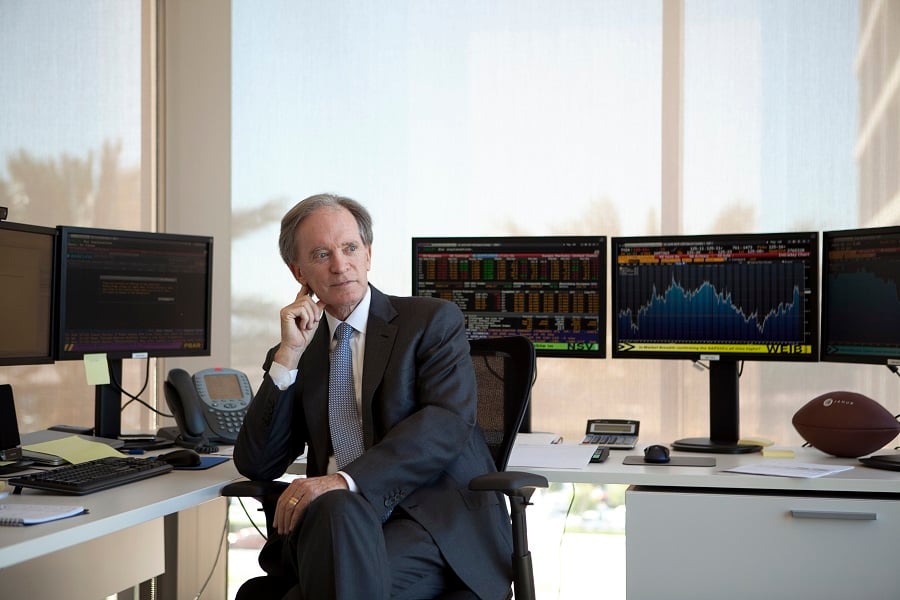After a shaky first five months, Bill Gross is regaining his footing at Janus Capital Group Inc., helped by a contrarian bet that the dollar's rally won't continue.
Mr. Gross's $1.5 billion Janus Global Unconstrained Bond Fund has returned about 2.4% in the past month as Treasuries rallied and the dollar gave up gains against the euro. The rebound reversed losses in the first five months and leaves Mr. Gross beating 68% of peers since he took over on Oct. 6, including the comparable fund at Pacific Investment Management Co., the firm that ousted him in September.
Mr. Gross said in an interview that he's been betting for several months that the dollar would stop rising and the gap between U.S. and European interest rates would narrow, a trade that hurt performance until markets turned a few weeks ago. His call contrasts with remarks by money managers such as Jeffrey Gundlach, who
warned investors not to bet against the dollar. Laurence D. Fink, who runs BlackRock Inc., the world's largest money manager, said April 6 that the dollar's strength risks undermining business confidence in the U.S.
“It's not the trade of the century or the trade of the decade but I think it's the trade of the year,” Mr. Gross said. “Patience in the last two to three months has been rewarded.”
Janus Unconstrained has gained 1.1% since Mr. Gross took over, compared with a return of less than 0.1% for the $9.8 billion Pimco Unconstrained Bond Fund, run by Mr. Gross's successor Daniel Ivascyn, Marc Seidner, and Mohsen Fahmi. In the past month, Mr. Gross has beaten 99% of comparable funds, according to Morningstar Inc.
(Related: Gross speaks out on his Pimco exit, plans at Janus)
'Obsessive Guy'
For most investors, one month or even six months is too short a period to evaluate a fund. Institutions such as pensions often require three- or five-year track records before they invest in a new manager.
Still, for Mr. Gross the rebound is important after his fund in February
suffered its first client withdrawals since he took over. Mr. Gross has said he's investing to “show clients and the world” that he can still win after leaving Pimco, which he built into a $2 trillion money manager at its peak. Mr. Gross, who is 70,
said last month he has “two, three, four years” to prove himself at Janus.
“I'm sort of an obsessive guy,” Mr. Gross said. “I have a happy night if I'm doing better, and a not so happy night if I'm not doing better. That's just being competitive. That's like somebody in the NBA being traded from the Miami Heat to Cleveland Cavaliers — next time you get on the court, you want to whip the pants off of them.”
'Bond Guy'
Mr. Gross, who characterized himself as a traditionally pessimistic “bond guy” in the interview, said he had been betting on U.S. Treasuries against German bunds, and selling credit-default swaps tied to the debt of countries that benefit from a weak U.S. dollar, including Mexico, China, and Colombia, he said.
The dollar has declined 3 percent against the euro since March 13 and Treasuries have gained 1.3 percent. Treasuries surged Friday after a report showed the economy added the fewest jobs since December 2013.
The fund struggled initially after Mr. Gross took over, declining 1.3% in the first five months through March 6. It trailed its benchmark in the fourth quarter last year primarily because it had plowed about 5% of net assets into debt issued by U.S., Russian and Brazilian energy companies. Those bonds and emerging market sovereign debt that Mr. Gross insured were all hit by the 42% collapse in crude prices in the period.
'Pie Crust'
In February, clients pulled $18.5 million from the fund, Morningstar estimated. Mr. Gross and his family own more than half of the fund as of Dec. 31, according to a filing by Denver-based Janus with the U.S. Securities and Exchange Commission.
Mr. Gross has recommended staying conservative, holding high-quality bonds and stocks with low ratios of share prices to earnings. He said
he favors using leverage to lift returns in an environment of persistently low interest rates and inflated asset prices, and selling volatility, betting that prices on debt from the U.S., U.K. and Germany won't swing outside a certain band, according to an investment outlook for Janus this month.
Mr. Gross said the investments in his fund mature within 18 months, what he calls a “pie crust” of short-dated corporate bonds for a relatively safe and reliable yield of 2%. He then adds derivative wagers as the “filling,” he said in the interview.
'Don't Do It'
Mr. Gross still sees the Federal Reserve raising interest rates this year, as it's “desperate to show they can get out of the wheelchair and stand on their own two legs,” he said.
Mr. Gundlach, who runs the $45.9 billion DoubleLine Total Return Bond Fund, has also predicted the Fed will raise interest rates this year, even if the economy doesn't support such a move. Still, he warned investors last month that they shouldn't be contrarian and bet against the U.S. dollar.
“Don't do it,” he said on a conference call March 10. “The dollar, which has been a world leader, is going to be a world leader.”







